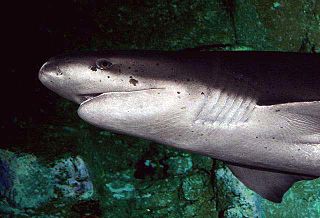
The Hexanchiformes are a primitive order of sharks, that numbering just seven extant species in two families. Fossil sharks that were apparently very similar to modern sevengill species are known from Jurassic specimens.

Rhizostomeae is an order of jellyfish. Species of this order have neither tentacles nor other structures at the bell's edges. Instead, they have eight highly branched oral arms, along which there are suctorial minimouth orifices. These oral arms become fused as they approach the central part of the jellyfish. The mouth of the animal is also subdivided into minute pores that are linked to coelenteron.

Jellyfish Lake is a marine lake located on Eil Malk island in Palau. Eil Malk is part of the Rock Islands, a group of small, rocky, mostly uninhabited islands in Palau's Southern Lagoon, between Koror and Peleliu. There are about 70 other marine lakes located throughout the Rock Islands. Millions of golden jellyfish migrate horizontally across the lake daily.

Aldisa is a genus of sea slugs, dorid nudibranchs, marine gastropod molluscs in the family Cadlinidae.

The spotted jelly, lagoon jelly, golden medusa, or Papuan jellyfish, is a species of jellyfish from the Indo-Pacific oceans. Like corals, sea anemones, and other sea jellies, it belongs to the phylum Cnidaria. Mastigias papua is one of the numerous marine animals living in symbiosis with zooxanthellae, a photosynthetic alga.

Mastigias is a genus of true jellyfish in the family Mastigiidae. It contains seven described species. Members of this genus are found widely in coastal regions of the Indo-Pacific, including saline lakes of Palau, but there are also records from the West Atlantic at Florida and Puerto Rico. The West Atlantic records are most likely the result of accidental introductions by humans.
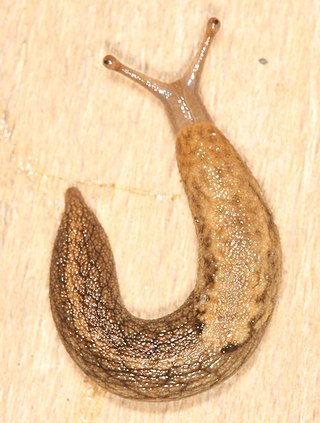
Prophysaon, common name taildropper slugs, is a genus of air-breathing land slugs, terrestrial pulmonate gastropod mollusks in the family Ariolimacidae.
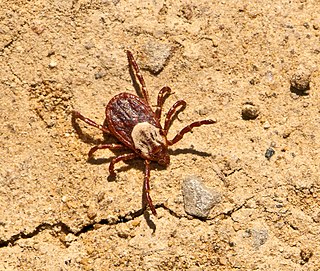
Dermacentor is a genus of ticks in the family Ixodidae, the hard ticks. The genus has a cosmopolitan distribution, with native species on all continents except Australia. Most are found in North America.
Cerradomys scotti, also known as Lindbergh's oryzomys, is a rodent species from South America in the genus Cerradomys. It is terrestrial and is found in the cerrado (savanna) ecozone of south central Brazil, Bolivia and Paraguay. The species is common and appears to tolerate a degree of agricultural habitat modification.

Astralium, common name star snails, is a genus of sea snails, marine gastropod mollusks in the family Turbinidae, the turban snails and star snails.

Bolma is a genus of medium to large sea snails with a calcareous operculum, marine gastropod molluscs in the family Turbinidae, the turban snails.

Aldisa andersoni is a species of sea slug, a dorid nudibranch, a marine gastropod mollusk in the family Cadlinidae.
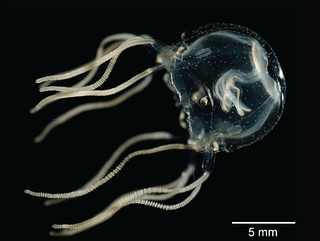
Tripedaliidae is a family of box jellyfish within class Cubozoa.
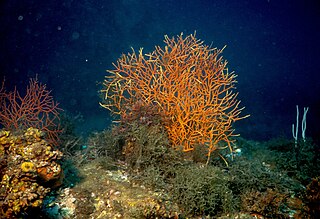
Leptogorgia is a genus of soft coral in the family Gorgoniidae. The genus has a widespread distribution with members being found in the eastern Atlantic Ocean from Western Europe to South Africa, the Mediterranean Sea, the Atlantic coasts of North and South America, the Antilles and the Pacific coast of America. Species are found in both shallow and deep waters.
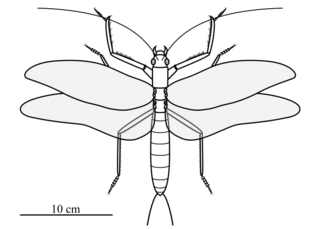
Clatrotitan is an extinct genus of titanopteran insect, known from the Triassic of Australia. It is originally described from a species, C. andersoni, then later study considered that Mesotitan scullyi as species of Clatrotitan too. But another study synonymized Mesotitan and Clatrotitan. A study in 2021 proposed to keep the two genera Clatrotitan and Mesotitan separated. C. andersoni had a large forewing, which was 13.8 centimetres (5.4 in) long.
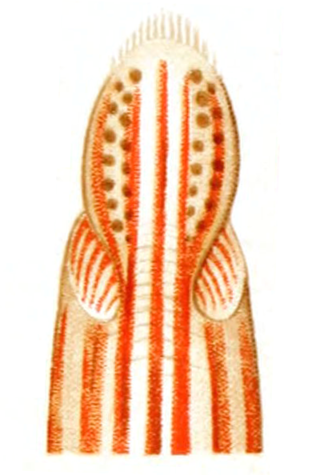
Brinkmannia is a monotypic genus of worms belonging to the family Brinkmanniidae. The only species is Brinkmannia mediterranea.
Paradrepanophorus is a genus of worms belonging to the family Paradrepanophoridae.

The golden jellyfish is a subspecies of spotted jellyfish that inhabits Jellyfish Lake on Eil Malk island in Palau in the western Pacific Ocean. Like the nominate subspecies, it derives part of its nutrition from symbiotic algae (Zooxanthellae) that live in their tissues and part of their nutrition from captured zooplankton.
Lychnorhiza arubae is a species of true jellyfish within the genus Lychnorhiza. It has been found in waters surrounding the Malay Archipelago.
Mastigietta is a genus of true jellyfish in the family Mastigiidae. It is monotypic, containing the sole species Mastigietta palmipes.















